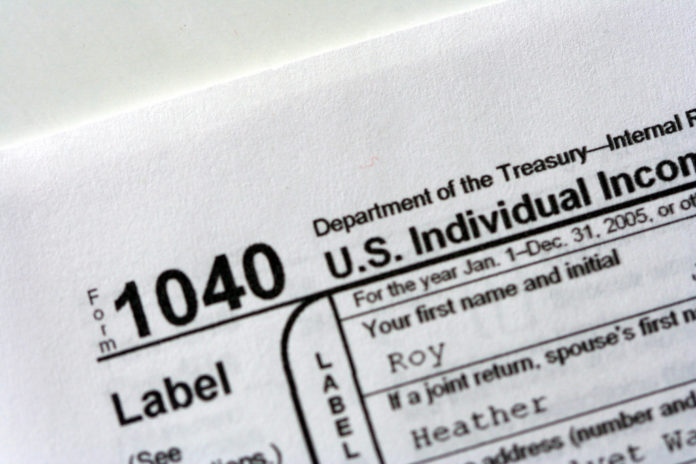(Updated: Includes fresh comments from Kelly, Kansas Chamber of Commerce, Senate president, House minority leader with edits throughout)
Democratic Gov. Laura Kelly on Monday vetoed a tax bill giving up more than $500 million over three years, contending it would unwind efforts to restore fiscal discipline after years of budget deficits caused by tax cuts.
“We cannot fix our state if we repeat the mistakes of the past,” Kelly said. “I refuse to endorse another round of fiscally reckless policies similar to those that left us the mess that my team is working so hard to clean up. The days of unbalanced budgets and mismanagement are over. ”
Kelly said the tax bill passed by the Legislature would cause a “self-inflicted budget crisis, diminishing all the investments we’ve worked so hard to rebuild and restore.”
Senate President Susan Wagle said Kelly’s veto effectively raises taxes on Kansans. She accused the governor of violating a campaign pledge to lower the food sales tax and not raise taxes.
“This veto is a devastating blow to Kansas businesses, to Kansas families and to everybody shopping at the gocery store for food for their family,” Wagle said.
Overriding the governor’s veto will be an uphill climb at best.
The House approved the legislation 76-43, eight votes short of the 84 needed to override a veto.
The Senate vote came up three votes short of the 27 needed for an override. The bill had two fewer votes on March 14 than when it passed the first time on Feb. 7.
House Minority Leader Tom Sawyer said he thought the Legislature would not be able to override the governor’s veto.
There are too many lawmakers who voted to repeal the Gov. Sam Brownback’s tax cuts in 2017 that are still around, he said.
“It’s bad tax policy,” Sawyer said. “It’s going back to the old Brownback tax experiment. “We’re trying to recover from that. There are a lot of people in this body who voted to get rid of the Brownback tax experiment and I don’t see people going back now and undoing it.”
The tax bill included a mix of provisions that mostly focused on returning extra revenue the state expects to collect from changes in the federal tax code.
It also included a penny reduction in the state sales tax on food and an internet sales tax for companies selling at least $100,000 worth of products online in Kansas.
Without passing the bill, supporters said the state stands to gain millions in extra revenue from a change Congress made in the federal tax code in late 2017.
Supporters of the bill stressed it was not similar to the Brownback tax policies. They said the bill only kept taxpayers from seeing a tax increase by decoupling from the federal tax code.
One estimate provided by the Council on State Taxation indicated that corporate taxes in Kansas would increase 11 percent if the state failed to pass the legislation.
However, Kelly said the state’s budget is still fragile and that any changes in tax policy need to wait.
The governor said she had denied funding requests from agency after agency because of the state’s precarious financial footing.
Kelly stressed she’s committed to lowering the food sales tax during her first term, but said governing is about balancing the state’s eeds.
She considered using a portion of the state’s $686 million ending balance to lower the food sales tax but decided that the state couldn’t make any tax code changes “just yet.”
Kansas is considered a “rolling conformity” state, meaning it must conform with any changes to the federal tax code automatically unless otherwise authorized by the Legislature.
The legislation, for instance, would allow individuals to itemize on their state tax returns if they don’t itemize on their federal form.
Taxpayers are less likely to itemize on their federal returns after Congress raised the standard deduction to $24,000 for families and $12,000 for individuals.
As a result, they will have to take the less generous Kansas standard deduction, which is $7,500 for married couples and $3,000 for individuals.
Currently, about 170,000, or 14 percent, of the state’s taxpayers itemize on their taxes.
With the change in the federal tax code, that number is projected to drop to about 103,000, or 9 percent, of all taxpayers.
Here’s a look at how changes in the federal tax code will affect individual taxpayers in the context of not being able to itemize.
For instance, the Department of Revenue estimated that a married couple filing jointly with no children and an income of $75,000 with $8,000 in itemized deductions would see a $26 increase in state taxes because of the federal tax code change.
A married couple filing jointly with two children and an income of $75,000 with $8,250 in itemized deductions would see a $39 increase in state taxes, according to the department’s estimates.
The bill also would decouple from the federal tax code so that multinational corporations would not be taxed on money made overseas that’s returned to the United States.
Among other things, the state wouldn’t tax income on domestic earnings and profits from foreign corporations between 1986 and 2018.
The so-called repatriation transition tax levies a one-time charge on previously untaxed, but now deemed repatriated foreign income currently in the wallets of U.S. shareholders, although at a reduced rated compared to what’s generally applied to corporate income.
The bill also would exempt global low-taxed income, something now taxed by the federal government as a way of ensuring that a minimum level of foreign income tax is paid on the earnings of the foreign subsidiaries of U.S. parent companies.
The bill also would allow banks to deduct their FDIC insurance premiums on their taxes. Corporations also would not have to pay taxes on state and local tax incentives.
Alan Cobb, chief executive officer and president of the Kansas Chamber of Commerce, said businesses will be hurt by the state’s failure to decouple from the tax federal tax code.
Fiscal estimates show that the legislation would reduce tax collections by $209.1 million in 2020, $145.2 million in 2021 and $150.6 million in 2022.
The corporate portion of the bill would have one of the biggest impacts, costing the state $137.2 million in revenue in 2020, $51.9 million in 2021 and $56.3 million in 2022. It totals out at $245.4 million over three years.
The itemization portion of the bill would give up about $50.1 million in revenue in 2020, $60.3 million in 2021 and $60.9 million in 2022. It totals $171.3 million over three years.
The reduction in the food sales tax would cost the state an estimated $43.5 million in 2020, $66.1 million in 2021 and $67.1 million in 2022. It totals $176.7 million over three years.















